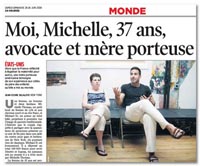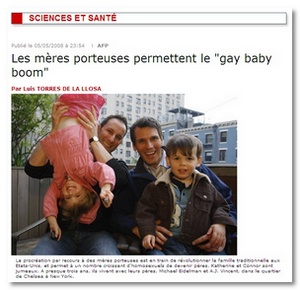Circle Surrogacy reports 40% of clients from Europe and Israel
Circle Surrogacy: more than 40% of clients are now from Europe and Israel, where legal restrictions drive gay men to seek surrogate mothers in the USA
The United States has become the preferred country for surrogacy among international prospective parents. U.S.-based Circle Surrogacy has helped clients from more than 30 countries, and this past year the agency hosted seminars about surrogacy in the U.S. in Stockholm, Paris, London and Tel Aviv. In addition to these cities, the group will offer 2009 sessions in Spain and Canada. Circle also reports a steady increase in the number of international clients, fueled by growing international media interest.
According to Circle founder and president John Weltman, “Surrogacy is prohibited or restricted in many countries that are very gay hospitable, including Sweden, France, the U.K., Spain, Italy and Belgium, the European countries we have most clients from.
In Israel, where we have dozens of clients as well, surrogacy is restricted to married heterosexual couples. So these people have been turning to the U.S.A. for help in having biological children of their own.”
John told us about the legal, societal and medical conditions that help make the U.S. the preferred country for surrogacy among Circle’s international prospective parents.
He says, “Having children in the States can be relatively easy for international couples. It is only necessary to come to the U.S. three to four times, including the 20-week ultrasound and birth. Departures from the United States are easy as well – most international couples return to their countries within 2 weeks of the birth of their children, with their names on the birth certificate and U.S. Passports, if they choose to apply for them.
We have heard of horror stories about international clients who worked with less informed agencies and faced considerable difficulties attaining citizenship or legal recognition for their babies or the non-biological father upon return home. For instance, U.K. citizens have to be matched with unmarried surrogates to avoid a situation where they are unable to relinquish the rights of the surrogate’s husband. Some countries will accept an amended birth certificate without a mother, some will not. We often have couples with mixed nationalities, and that presents additional challenges.”
Circle’s staff also meets regularly with prospective clients for intake consultations in their own countries and cities, although many still conduct them over the phone or video conferencing. Once they become clients, Circle’s staff leads all parents through the logistical, legal and administrative processes involved from day one, and until they gain full custody of their newborns and bring them home.
In the video below, Peter – a Swedish gay father who had twins through surrogacy in the U.S.A. – describes his experience. He talks about why he and his partner chose surrogacy in the U.S., and why they chose Circle Surrogacy. Peter also speaks in length about what both heterosexual and gay Swedes need to do in order to bring back their newborns to Sweden, and gain full citizenship status for them. John Weltman also offers remarks on the subject.
Additional clips from this seminars and others in Israel and France are available on Circle Surrogacy’s YouTube channel.



